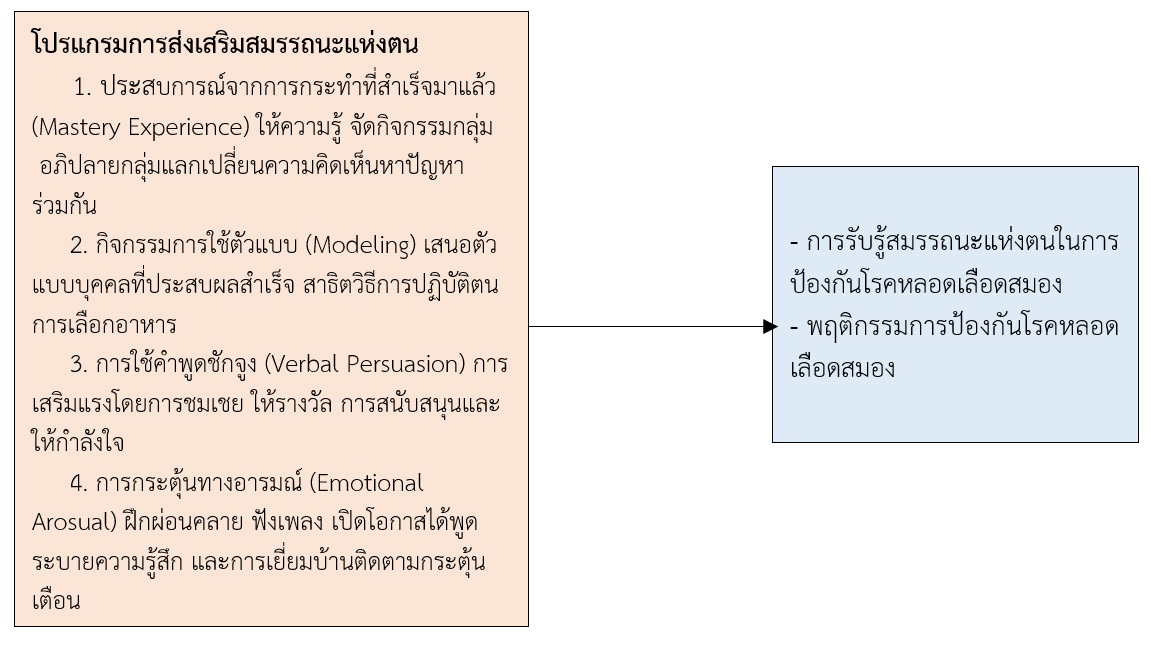ประสิทธิผลของโปรแกรมเสริมสร้างสมรรถนะแห่งตนต่อพฤติกรรมการป้องกัน โรคหลอดเลือดสมองในผู้สูงอายุโรคไม่ติดต่อเรื้อรัง อำเภอคลองขลุง จังหวัดกำแพงเพชร
คำสำคัญ:
ผู้สูงอายุโรคไม่ติดต่อเรื้อรัง, พฤติกรรมป้องกันโรคหลอดเลือดสมอง, โปรแกรมการส่งเสริมสมรรถนะแห่งตนบทคัดย่อ
การวิจัยกึ่งทดลองแบบสองกลุ่มแบบวัดซ้ำนี้ เพื่อศึกประสิทธิผลของโปรแกรมเสริมสร้างสมรรถนะแห่งตนต่อพฤติกรรมการป้องกันโรคหลอดเลือดสมองในผู้สูงอายุโรคไม่ติดต่อเรื้อรัง อายุ 60 ปีขึ้นไป ที่มารับบริการที่คลินิกโรคไม่ติดต่อเรื้อรัง โรงพยาบาลคลองขลุง จังหวัดกำแพงเพชร จำนวน 98 คน คัดเลือกกลุ่มตัวอย่างแบบเจาะจงตามคุณสมบัติที่กำหนด แบ่งเป็น 2 กลุ่ม ๆ ละ 49 คน โดยกลุ่มควบคุมได้รับคำแนะนำปกติ กลุ่มทดลองจะได้รับโปรแกรมเสริมสร้างสมรรถนะแห่งตน ร่วมกับคำแนะนำปกติ เป็นระยะเวลา 12 สัปดาห์และติดตามที่ 16 สัปดาห์ เครื่องมือที่ใช้ในการวิจัยคือโปรแกรมการส่งเสริมสมรรถนะแห่งตนในการป้องกันโรคหลอดเลือดสมอง แบบสอบถามการรับรู้สมรรถนะของตนเอง และแบบสอบถามพฤติกรรมการป้องกันโรคหลอดเลือดสมอง ผ่านการตรวจสอบคุณภาพของเครื่องมือโดยผู้เชี่ยวชาญ 5 ท่าน ได้ค่าความเชื่อมั่นสัมประสิทธิ์แอลฟาของครอนบาค ด้านการับรู้สมรรถนะแห่งตน เท่ากับ .87 ด้านพฤติกรรมการป้องกันโรคหลอดเลือดสมอง เท่ากับ .90 วิเคราะห์ข้อมูลด้วยสถิติพรรณนา สถิติ Independent t-test วิเคราะห์ความแปรปรวนเมื่อมีการวัดซ้ำภายในกลุ่มด้วย ทดสอบรายคู่ด้วย Bonferroni ผลการวิจัย พบว่า
1. ค่าคะแนนเฉลี่ยของพฤติกรรมการป้องกันโรคหลอดเลือดสมอง การรับรู้สมรรถนะแห่งตนในการป้องกันโรคหลอดเลือดสมอง ภายหลังทดลอง 12 สัปดาห์ และระยะติดตาม 16 สัปดาห์ สูงกว่ากลุ่มควบคุมที่ได้รับคำแนะนำตามปกติ อย่างมีนัยสำคัญทางสถิติที่ระดับ .001
2. ค่าคะแนนเฉลี่ยของพฤติกรรมการป้องกันโรคหลอดเลือดสมอง การรับรู้สมรรถนะแห่งตนในการป้องกันโรคหลอดเลือดสมอง หลังทดลอง 12 สัปดาห์ และระยะติดตาม 16 สัปดาห์ สูงกว่าก่อนทดลอง อย่างมีนัยสำคัญทางสถิติที่ระดับ .001
จากผลการวิจัยแสดงให้เห็นว่ากิจกรรมกระบวนการกลุ่มและการเยี่ยมบ้านช่วยให้เกิดกระบวนการเรียนรู้ด้วยตนเองของผู้สูงอายุ เจ้าหน้าที่สาธารณสุขควรใช้กระบวนการกลุ่มและการเยี่ยมบ้านในการจัดกิจกรรมส่งเสริมความรู้และการปฏิบัติตัวเพื่อป้องกันโรคหลอดเลือดสมองในผู้สูงอายุที่มีโรคเรื้อรัง
เอกสารอ้างอิง
Assantachai, P. (2000). Common health problems in the elderly and their prevention. Bangkok: Union Creation printing. (in Thai).
Bandura, A. (1986). The explanatory and predictive scope of self-efficacy theory. Journal of Clinical and Social phychology, 4, 359-373.
Bandura A. (1997). Self-efficacy: The exercise of control. New York: W.H. Freeman and Company.
Bunhu B, Toskulkao T, & Changmai S. (2020. The effects of transition promotion program on confidence and coping with health transition in first ever ischemic stroke patients. Thai Journal of Cardio-Thoracic Nursing, 31(2), 187-204.
Chulalongkorn Stroke Center of Excellence. (2015). Stroke. Bangkok: Amarin printing Group. (in Thai)
Department of Health. (2019). Age group knowing healty life. Retrieved September 12, 2019 from https://multimedia.anamai.moph.go.th/wp-.
Division of non communicable disease. (2015). Guidelines for Assessment of Cardiovascular Risk. Bangkok: Office of Printing Works, Veterans Affairs Organization.
HDC dashboard. (2021). HDCservice. Retrieved April 15, 2021 from:https://hdcservice.moph.go.th/hdc/main/index.php#.
Jamkrajang T, Boonchan N, & Mala J. (2017). The Effectiveness of the Self-efficacy and Social support Enhancement Program on Medication adherence and Blood pressure among Hypertensive Elderly in Community. Journal of The Royal Thai Army Nurses, 18(1), 270-279. (in Thai)
Kanokthet, T. (2016). Sociology of public health. Phitsanulok: Naresuan University Publishing House. (in Thai)
Kitreerawutiwong, N. (2017). Public Health Research: From Principle to Practice. Phitsanulok: Naresuan University Publishing House. (in Thai).
Muangpaisan, W. (2017). Gerontology and geriatrics for primary care practice. Bangkok: Association of Thai Probiology and Geriatric Medicine. (in Thai)
Nantsupawat, W. (2008). Elderly Nursing Challenges with the aging population. (2nd.). Khon Kaen: Khon Kaen printing. (in Thai).
Ouysakul, K., & Jitpanya, C. (2012). Factors Related to Stroke Awareness in Hypertensive Patients in Southern Region, Thailand. Journal of The Police Nurse, 40(1), 15-26. (in Thai)
Painupong, I., Sae-Sia, W., & Kupantawee, N. (2015). Pain Management Programme and Self-Empowerment Exercise Activity: Their Impact on Elderly Total Knee Arthroplasty Patients' Recovery. Thai Journal of Nursing Council, 30, 99-110. (in Thai)
Polit, D.F., & Beck, C.T. (2008). Nursing Research: Generating and Assessing Evidence For Nursing Practice. Philadelphia: Lippincott Williams & Wilkins.
Promyu, R., Naewbood, S., & Wannapornsiri, C. (2015). Effects of a health behaviors developing program for the elderly with hypertension. Journal of Hursing and Health, 10(3), 108-120.
Purakom, A. (2018). Promoting Physical Activity for Health in the Elderly. Nakhon Pathom: Phetkasam Printing Group. (in Thai).
Sanghuachang, W. (2013).effects of education program using group process and telephone follow up on stroke prevention knowledge and practice in elderly with chronic illness. J Prapokklao Hosp Clin Med Educat Center 30, 260-273. (In Thai)
Strategy and Planning division office of Health district at 1-13 about ministry of Public Health. (2020). Report thaihealth district level. Bangkok: Chinakson Printing House. (in Thai)
Suankratay, C. (2015). Medicine book 1. Bangkok: Chulalongkorn University Printing House. (in Thai).
Singtha, N. (2015). Effects of The Enhancing Self-Efficacy Program on Prevention Behavior Among Risk Group of Pre-Hypertension in Bankhok District, Uttaradit Province. Faculty of Nursing Science, Naresuan University. (in Thai).
Suphunnakul, P. (2018). Sathiti prayuk samrap: Applied Statistics For public health research. Phitsanulok: Naresuan University Publishing House. (in Thai)
Thongcharoen, V. (2015). Science and Arts of Nursing Patients. Bangkok: NP PRESS LTD. (in Thai)
Watcharanurak, P., & Klubklay, A. (2017). Factors Influencing Preventive Behavior among Stroke-Risk Patients in Songkhla Province. The Southern College Network Journal of Nursing and Public Health, 4(1), 217-233. (in Thai)
Wongsawat, P. (2018). Experimental research design : application for research to improve health behaviors. Bangkok: CDMK printing. (in Thai)
Yotpanya, A. (2015). Effectiveness of a health behavior change program applying self-efficacy theory on a diabetes mellitus type 2 risk group in than district, Utai Thani Provine. Master of Public Health Program, Naresuan University. (in Thai).
Kittiboonthawal, P., Yingrengreung, S., & Srithanya, S. (2014). Perceptions of Stroke Warning Signs among Risk Patients. Nursing Journal of the Ministry of Public Health, 23(3), 132-141. (in Thai)
Moonthee, W., Monkong, S., Sirapo-ngam, Y., & Leelacharas, S. (2016). Impact of Transitional Care Programme and Family Caregivers on Stroke Patients’ Routine Activity Performance, Complications, and Satisfaction. Thai Journal of Nursing Council, 31(1), 95-110. (in Thai)

ดาวน์โหลด
เผยแพร่แล้ว
ฉบับ
ประเภทบทความ
สัญญาอนุญาต
ลิขสิทธิ์ (c) 2022 วารสารเครือข่ายวิทยาลัยพยาบาลและการสาธารณสุขภาคใต้

อนุญาตภายใต้เงื่อนไข Creative Commons Attribution-NonCommercial-NoDerivatives 4.0 International License.
1. บทความหรือข้อคิดเห็นใด ๆ ที่ปรากฏในวารสารเครือข่าย วิทยาลัยพยาบาลและการสาธารณสุขภาคใต้ ที่เป็นวรรณกรรมของผู้เขียน บรรณาธิการหรือเครือข่ายวิทยาลัยพยาบาลและวิทยาลัยการสาธารณสุขภาคใต้ ไม่จำเป็นต้องเห็นด้วย
2. บทความที่ได้รับการตีพิมพ์ถือเป็นลิขสิทธิ์ของ วารสารเครือข่ายวิทยาลัยพยาบาลและการสาธารณสุขภาคใต้







